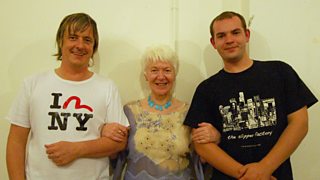Living with ME is ‘like being stuck in a waiting room’, says Belle and Sebastian’s Stuart Murdoch
26 January 2018

Belle and Sebastian’s frontman might look like the picture of health when he’s performing in front of thousands of fans.
Sometimes it’s like the worst hangover you’ve had, and you’re going to have it all day and all next week as wellStuart Murdoch
But for most of his adult life Stuart Murdoch has been living with Myalgic Encephalomyelitis (ME), or Chronic Fatigue Syndrome (CFS).
.
“Sometimes it’s like the worst hangover you’ve had, and you’re going to have it all day and all next week as well,” he said.
“And then sometimes it’s like the day before you come down with a bad flu. That sort of feeling that persists and persists”.
Touring can be strenuous and of how Belle and Sebastian cope with his needs.
“We have a schedule that works for me. I can go away and rest all day and have the performances in the evening, then immediately rest.”
However, the band have in the past been forced to cancel a tour of mainland Europe due to his ill health.
There are estimated to be a quarter of a million people with ME/CFS in the UK and potentially 17 million worldwide.
Dr Charles Shepherd of the ME Association, , had this to say about treatment of the illness:-
“A major stumbling block with getting effective treatment for these patients has been the NICE guideline – [NICE is the body that decides which treatments should be available on the NHS] – on this illness which came in in 2007. So we’ve been stuck for almost 10 years with a guideline which many of us have felt – certainly parts of it, key parts of it, as being unfit for purpose. Because it has relied really far too heavily on advising that people should be directed towards Cognitive Behavioural Therapy and graded exercise and really very little advice on symptom management.”
Waiting for answers
Following a recent public consultation, NICE has begun on the diagnosis and management of ME/CFS.
But while this takes place there are patients desperately in need of solutions.
“Think about a waiting room full of people in hospital,” said Stuart.
“People with all the other conditions get called to the doctor because there’s a pathway from which to proceed. Whether people get better or don’t, there’s a pathway.
“But the ones left in the waiting room are the ME people because the doctors just don’t know what the pathway is, so there’s no way to proceed."
Stuart continued, “The key thing is with ME people or with chronic fatigue people, is that it’s absolutely a physical thing. These people are ill. They need to be believed and they need to be helped".
The programme in full
-
![]()
Pennie Latin presents a story of confusion, misunderstanding, misdirection, misdiagnosis and misery.
- (Â鶹ԼÅÄ News, 18 May 2018)
More health stories
-
![]()
The singer explores a subject close to her heart.
-
![]()
The Swedish star sees the upside to her condition.
-
![]()
A recent survey found 60% of all musicians have had some sort of mental illness.
-
![]()
Robert Wyatt faced discrimination when touring due to his disability.
Latest features from Â鶹ԼÅÄ Scotland
-
![]()
'Wild swimming helps me process the grief of losing my son'
The benefits of cold water therapy.
-
![]()
Winter adventures are appealing, but an expert advises caution
Trips in winter require particular knowledge and skills.
-
![]()
The rescuers: Why volunteers risk their lives in mountain emergencies
Landward meets members of the Cairngorm Mountain Rescue Team.
-
![]()
‘Look for the light’ – practical tips to help you through another winter with SAD
Useful advice and tips to combat low moods at this time of year.
-
![]()
How you could be a binge drinker without even knowing
Binge drinking is classed as fewer units than many people may realise.
-
![]()
How chocolate biscuits and drama classes helped one man leave prison behind
The healing power of creativity.
-
![]()
'When people believe in you, it’s life-changing'
Author Graeme Armstrong revisits the man who helped turn his life around.
-
![]()
The 'breath-taking' display of US birds swept on to British soil
Recent storms have brought rare birds to our shores.
-
![]()
Six things we learned about Alan Cumming on Take the Floor (Spoiler: includes accordions)
The actor spoke to Take the Floor's Gary Innes.
-
![]()
How street gangs trap young men in a dangerous cycle of violence
The almost inescapable pull of life in a gang.
-
![]()
Why stylist Gok Wan believes there's no such thing as bad fashion
The fashion expert says we should stop following rules and do what feels right.
-
![]()
Is sending a CV still the right way to apply for a job?
They've been central to job applications for years, but are they worth it?




















